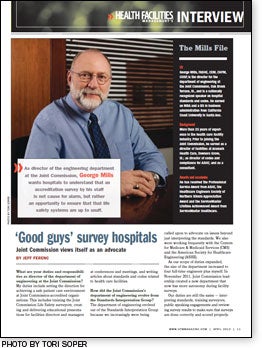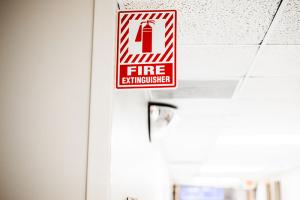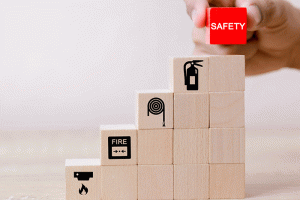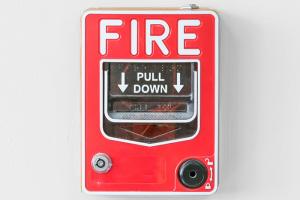'Good guys' survey hospitals
 As director of the engineering department at the Joint Commission, George Mills wants hospitals to understand that an accreditation survey by his staff is not cause for alarm, but rather an opportunity to ensure that life safety systems are up to snuff.
As director of the engineering department at the Joint Commission, George Mills wants hospitals to understand that an accreditation survey by his staff is not cause for alarm, but rather an opportunity to ensure that life safety systems are up to snuff.
What are your duties and responsibilities as director of the department of engineering at the Joint Commission?
My duties include setting the direction for achieving a safe patient care environment at Joint Commission-accredited organizations. This includes training the Joint Commission Life Safety surveyors, creating and delivering educational presentations for facilities directors and managers at conferences and meetings, and writing articles about standards and codes related to health care facilities.
How did the Joint Commission's department of engineering evolve from the Standards Interpretation Group?
The department of engineering evolved out of the Standards Interpretation Group because we increasingly were being called upon to advocate on issues beyond just interpreting the standards. We also were working frequently with the Centers for Medicare & Medicaid Services (CMS) and the American Society for Healthcare Engineering (ASHE).
As our scope of duties expanded, the size of the department increased to four full-time engineers plus myself. In November 2011, Joint Commission leadership created a new department that now has more autonomy during facility surveys.
Our duties are still the same — interpreting standards, training surveyors, public speaking engagements and reviewing survey results to make sure that surveys are done correctly and scored properly. In addition, we are also involved in advocacy and educating the accredited organizations.
What is involved in the survey accreditation process?
Most surveys average three to five days. Life Safety Code surveyors are usually on-site for a minimum of two days with an additional day if the total square footage of health care occupancy space exceeds 1.5 million square feet or if there are three or more separate health care buildings, for a potential of four survey days. Larger systems may require an additional day.
Most hospitals have findings from a survey, which we refer to as Requirements for Improvement. These should not be perceived as punitive, as they simply identify areas where the organization needs to correct its deficiencies.
We survey every hospital on an 18-month to three-year cycle and 5 percent of our surveys are validated by CMS. When CMS validates a survey, it uses a state agent or department; so, for example, if CMS wants to do a validation survey in Illinois, it would use the Illinois Department of Public Health.
All surveys are unannounced with the exception of those at military bases and the Federal Bureau of Prisons for security clearance reasons.
Do hospitals ever lose accreditation after a survey?
The Joint Commission has a robust appeals process that at-risk organizations can use, so it is uncommon for an organization to lose its accreditation. CMS also will work with hospitals to make sure they get things right and give them opportunities to correct situations, and we do the same thing.
There's only one time it's extremely serious and that is if we find what we call an immediate threat to life, or ITL, such as failure of a generator system, a fire alarm system, a sprinkler system or a medical gas master panel. These require immediate action and could result in potential loss of accreditation and reimbursement if not resolved satisfactorily.
When we're speaking in the field, we teach facilities personnel to monitor these critical systems and verify that they are running properly. At a minimum, they should implement an interim plan while the problem is being resolved. Since we've been stressing the importance of these systems, the number of ITLs we've issued has decreased dramatically.
What are some of the major engineering issues that hospitals need to focus on to retain accreditation?
I am concerned about infrastructure. Many hospitals are more than 50 years old and still have their original power plants. The life expectancy of the equipment is significantly less than 50 years, but because of good facility management many of these systems are still running.
But at what cost? As a certified energy manager, I need to be concerned about the inefficiencies of older technology. As an accrediting body, we have to be concerned that infrastructure systems deliver the proper airflow with associated air changes and pressure differentials.
How do CMS and the Joint Commission align in terms of standards?
As part of the deeming process that allows the Joint Commission to survey on behalf of CMS, our standards go through a review process with CMS. There are some differences beyond what CMS requires. One area involves manufacturers' recommendations for preventive maintenance of medical devices and instruments.
Our standards allow the organization to follow either the manufacturer's recommendations or they may define their maintenance activities based on their experience of what maintenance needs to be performed and their level of risk. We are providing three options, whereas CMS requires following manufacturers' recommendations only.
Consider this example: As a manufacturer writes a preventive maintenance (PM) guideline for a defibrillator, it considers the most active, aggressive conditions. The PM for that device might take two hours. If a second defibrillator of the same make and model is stored in a nursing unit on a crash cart, based on the lack of a harsh environment, this unit might only need a battery check and calibration check — a scheduled maintenance of 30 minutes compared with a two-hour maintenance for the device in an ambulance.
For a defibrillator in the back of the ambulance, it certainly makes sense to follow the PM requirement; however, for the defibrillator in the nursing unit, it isn't as urgent. We estimate there is a significant reduction in annual cost if organizations are required to follow only manufacturers' recommendations due to a decrease in the labor required for PM.
The Joint Commission recommended to CMS that this condition be changed, and we are working with ASHE and the Association for the Advancement of Medical Instrumentation on a document to modify preventive maintenance standards.
What distinguishes the Joint Commission from other accrediting organizations?
If you look at our mission statement, we are about patient safety and ensuring a built environment that's conducive to improving health care, and inspiring health care organizations to excel.
What sets us apart, I believe, is that our standards focus on patient safety and quality of care. We are proactive; the others tend to be reactive.
I used to get calls from persons who would say, 'I have a friend who wants to know about this situation.' They were calling for themselves, but didn't want us to know. I don't get those calls any more. People call and say, 'Hey, George, I've got a question about this.'
My goal is for health care facilities to see us as a resource that they can call for answers to questions they may have.
I hope they see us as the good guy.
Jeff Ferenc is senior editor for Health Facilities Management.
| Sidebar - The Mills File |
| CV: George Mills, FASHE, CEM, CHFM, CHSP, is the director for the department of engineering at the Joint Commission, Oak Brook Terrace, Ill., and is a nationally recognized speaker on hospital standards and codes. He earned an M.B.A. and a B.S. in business administration from California Coast University in Santa Ana. Background: More than 25 years of experience in the health care facility industry. Prior to joining the Joint Commission, he served as a director of facilities at Aramark Health Care, Downers Grove, Ill.; as director of codes and compliance for ASHE; and as a consultant. Awards and accolades: He has received the Professional Service Award from ASHE, the Healthcare Engineers Society of Northern Illinois Appreciation Award and the ServiceMaster Lifetime Achievement Award from ServiceMaster Healthcare. |




